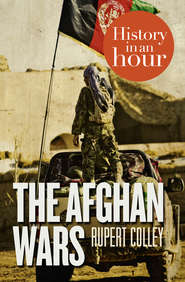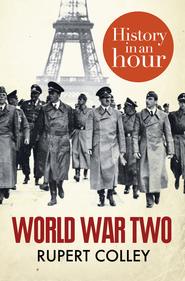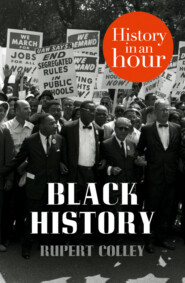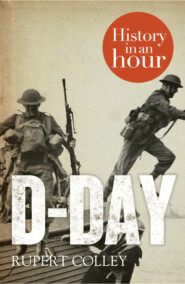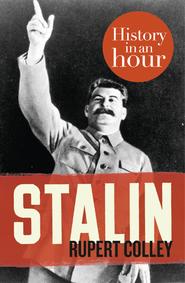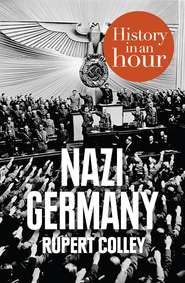По всем вопросам обращайтесь на: info@litportal.ru
(©) 2003-2024.
✖
1914: History in an Hour
Настройки чтения
Размер шрифта
Высота строк
Поля
Russia also harboured dreams of expansion – towards the Pacific in the east. But, after a two-year war, the Russians, like the British in South Africa, were humbled by a supposedly inferior foe, the Japanese. The Russian tsar, Nicholas II, had hoped the Russo-Japanese War of 1904–5 would distract his people and quell the simmering unrest infecting his empire and restore national prestige. Instead, defeat merely intensified the sense of dissatisfaction with the tsar and his autocratic rule, leading to unrest and public demonstrations. Nicholas responded to what became known as the Russian Revolution of 1905 with the promise of democracy and reform, promises he reneged on almost as soon as they had been implemented.
On the western side of its empire, Russia relied on the imports and exports transported across the Black Sea. In order to reach the Black Sea, Russian ships needed continual access through the Turkish Straits, including the Dardanelles. When, in 1912, the Ottoman Empire had closed the Dardanelles, it caused temporary chaos to the Russian economy. Thus, Russia eyed the disintegrating Ottoman Empire with both interest and concern.
Austria-Hungary
While Britain’s empire was still flourishing, notwithstanding the odd reverse, the empire of Austria-Hungary, once the Holy Roman Empire, was slowly crumbling. Ruled since 1848 by the elderly Franz Joseph, the empire encompassed several ethnic groups, and not all of them happily included. Particularly resentful were the Bosnian Slavs. Bosnia, having been shackled for three centuries to the Ottoman Empire, had become, in 1878, part of Austria-Hungary and, from 1908, a fully annexed part of it. The Slavs of Bosnia wished unification with their fellow Slavs to the south, in Serbia. But the loss of territory, and thereby status, and the example it would provide to other disgruntled ethnicities within the empire, was not something the Austro-Hungarian leadership was prepared to contemplate.
Serbia
Serbia itself had only been a fully independent nation since 1882, but had flexed its military muscle in defeating first the Ottoman Empire and then Bulgaria in two Balkan Wars between 1912 and 1913. It viewed the empire immediately to its north with mounting hostility. As a landlocked nation, Serbia desired access to the Adriatic but with Bosnia annexed by Austria-Hungary, and Albania, also recently established as an independent nation, blocking the route further south, they were to remain frustrated.
Italy
Italy, like Germany, was a new country, unified in 1861, and, like Germany, it desired its own empire. An excursion to capture Tunisia was thwarted in 1881 by the French and worse still for Italy’s reputation was a humiliating defeat to the Ethiopians in 1896. But Italy did gain sovereignty over Libya, having defeated the Ottomans in 1912.
Belgium
Belgium wished to remain aloof from these undercurrents of international manoeuvring, putting its faith in the 1839 Treaty of London where, among the signatories recognizing its neutrality, were Great Britain and Germany. Meanwhile, between 1885 and 1908, the Belgian king, Leopold II, put his efforts into running his own empire, the Congo Free State, an enterprise which caused the death of over 10 million Congolese.
Treaties and Alliances (#ude1faadd-2e6c-53dd-9860-9be1259a4236)
Military alliances in 1914
These various ambitions and fears resulted in a number of treaties and alliances as governments sought to take sides in the name of defence and national security. Germany and Austria-Hungary signed the ‘Dual Alliance’ in 1879, a pledge to aid one another in case of an attack, with Italy adding their signature in 1882 to make it the Triple Alliance. (In 1902, Italy also secretly signed a similar agreement with France, in which Italy agreed to remain neutral should Germany attack France.)
Although technically a defensive agreement, the Triple Alliance caused much alarm. In 1894, as a direct consequence of the three-way treaty, France and Russia ratified a military alliance, resulting in what Germany feared the most – a potential enemy on both its western and eastern borders. In 1904, Britain signed an agreement with France, the Entente Cordiale. Although it was not a military alliance and did not commit either side should the other be attacked, the agreement did signal greater understanding between the two nations, recognizing their respective African territories and ending traditional rivalries.
Three years later, in 1907, Britain signed a similar agreement with Russia, partly to acknowledge their spheres of influence in Central Asia, where Afghanistan, in particular, had been a source of conflict for almost a century. So, in responding to what was happening in Europe, Britain had managed to forestall colonial enmity with two of its longstanding rivals. Thus the three nations, Britain, France and Russia, had, through the Triple Entente, formed a powerful counterbalance to the Triple Alliance. The powers of Europe had now set their stall and committed themselves to one side or the other.
Further afield, in 1902, Great Britain had signed an alliance with Japan with the aim of discouraging Russian expansionism in the Far East.
Despite the multiple failsafes against potential hostilities, war was nevertheless regarded by many civilian members of these states as inevitable and, for some, even desirable. War was seen in intellectual circles as a process of national rejuvenation, a means by which to cleanse the ills of society. In the 1890s, the German historian, Heinrich von Treitschke, wrote, ‘If the flag of the State is insulted, it is the duty of the State to demand satisfaction, and if satisfaction is not forthcoming, to declare war, how trivial the occasion may appear.’ The German Youth League, the Jungdeutschlandbund, declared, ‘War is beautiful.’ We must wait for it with the manly knowledge that when it strikes, it will be more beautiful and more wonderful to live for ever among the heroes on a war memorial … than to die an empty death in bed, nameless.’ While in Great Britain, Robert Baden-Powell, the founder of the Boy Scouts’ movement, urged young British boys to play their part in protecting the empire: ‘Play up! Play up! Each man in his place and play the game!’ Writing in 1899, British writer, Sidney Low, spoke for many when he wrote, ‘A righteous and necessary war is no more brutal than a surgical operation. Better give the patient some pain … than allow the disease to grow upon him until he becomes an offence to himself … and dies in lingering agony.’
War, when it came, resulted from discord in the Balkans, as Otto von Bismarck had predicted sixteen years earlier: ‘If there is ever another war in Europe, it will come out of some damned silly thing in the Balkans.’ But even Bismarck could not have predicted a war of such magnitude. Not many could. The exception perhaps was the political philosopher, Friedrich Engels, who in 1887, wrote, ‘Eight to ten million soldiers will swallow each other up and in doing so eat all Europe more bare than any swarm of locusts … Crowns will roll by dozens in the gutter.’ A prediction that would prove uncannily correct, but even within this apocalyptic vision, Engels predicted a silver lining – the ‘establishment of the conditions for the final victory of the working class’.
Assassination of an Archduke (#ude1faadd-2e6c-53dd-9860-9be1259a4236)
Following his father’s death in 1896, Franz Ferdinand found himself next in line to the Austro-Hungarian throne. His relationship with his uncle, the emperor, was fractious and was not helped when, in 1900, he insisted on marrying a commoner, Sophie, Duchess of Hohenberg. Franz Ferdinand got his own way but at a price, having had to sign away the right of any future sons in succeeding him, and agree that Sophie – as a non-royal – would never become empress. To add to the indignity, Sophie was barred from attending royal occasions. The only exception was in regard to the archduke’s position as field marshal when, acting under his military capacity, he was allowed to have his wife at his side.
And so it was that Franz Ferdinand, together with his wife, arrived in Sarajevo, capital of Bosnia, to inspect the troops on Sunday, 28 June 1914. The date was also a significant day for Serbia – it was their national holiday and the anniversary of the 1389 Battle of Kosovo, when an invading army of Ottomans inflicted a defeat on the Serbian nation, which, 525 years later, still held an important place in the Serb identity. Franz Ferdinand’s visit was, for the Serbian nationalists, the ideal occasion to use terror as a form of protest against Habsburg rule. An organization called the Black Hand, sometimes known as ‘Union or Death’, prepared accordingly. The leader of the Black Hand had written two years previously that ‘If Serbia wants to live in honour, she can only do this by war’, referring to the Habsburg Empire as ‘aliens from the north’.
Moments before: the assassination of Franz Ferdinand and his wife, 28 June 1914
As the archduke’s procession of open-top cars passed slowly down the city’s main avenue, six members of the Black Hand joined the crowds, each armed with a bomb, a revolver and, in the case of capture, a vial of cyanide. Among them was 19-year-old Gavrilo Princip. It was eleven in the morning. The first of Princip’s colleagues lining the route lost his nerve, but another held his and threw his bomb before jumping in the river where he was soon caught and arrested. The bomb fell on to the back of Franz Ferdinand’s car, bounced off and landed beneath the vehicle following and exploded, injuring twenty people but not the archduke or his wife. Disheartened by the failure, Princip trudged to a nearby tavern.
Franz Ferdinand, unsurprisingly, was not impressed. On arriving, as planned, at the City Hall, he complained to the city mayor, ‘Mr Mayor, I come to Sarajevo on a visit, and I get bombs thrown at me. It is outrageous.’ Then, in delivering a speech, he ended with the words, ‘I see in [the people of Sarajevo] an expression of joy at the failure of the attempt at assassination.’
Arrest of Gavrilo Princip following his assassination of Franz Ferdinand
Later in the day, on the duchess’s suggestion, Franz Ferdinand declared his wish to visit the injured lying in hospital. On leaving the hospital, his chauffeur, unfamiliar with this part of the city, turned down a one-way street (which was ironically named after the emperor, Franz Josef). On realizing his mistake, the chauffeur tried to reverse but stalled next to the tavern where Princip was still cursing his bad luck. On seeing the royal car in front of him, Princip leapt on to its running board, drew his revolver and fired. The first bullet killed the duchess instantaneously. ‘Sophie, don’t die,’ cried the archduke. ‘Stay alive for the children.’ The second bullet caught him in the throat. As the car rushed to the governor’s residence, a member of his entourage asked him if he was in great pain, to which the archduke replied several times, ‘It is nothing’, before expiring. Princip was wrestled to the ground, his revolver snatched from his hand. He managed to swallow the cyanide but the poison, being so old, had no effect.
Austria-Hungary reeled in shock: the heir to the throne was dead, killed by Serbian terrorists. There were anti-Serb riots in Vienna. For the Austro-Hungarian government, it provided the perfect pretext to enforce its authority on its Slav neighbour. It was too good an opportunity to miss.
The assassination of Franz Ferdinand brought a premature end to the 1914 Kiel Regatta. Although Germany and Britain may have been in the midst of a naval arms race, a fleet of British ships, having been invited, attended the annual celebrations in Germany. British and German officers traded compliments on their respective ships, abiding by an unspoken rule not to ask too many searching questions of each other. Wilhelm, dressed in the uniform of a British Admiral of the Fleet, was guest of honour aboard the British dreadnought, the King George V, signing its visitors’ book and being taken on a tour. On the afternoon of 28 June, Wilhelm was racing his yacht, Meteor, pitting his sailing skills in an Anglo-German yacht race. A telegram arrived. Folded in a cigarette case, it was tossed over to the Kaiser. Written by the archduke’s chauffeur, it made for grim reading. The Kaiser’s friend, Franz Ferdinand, whom he had visited only a fortnight before, had been assassinated. The yacht race was aborted; the party was over.
The Road to War (#ulink_92b49bcb-faec-530c-beb4-347be18f1428)
The Austro-Hungarians took their time on deciding how best to exploit the situation, conscious of not rushing into overcommitting themselves. Indeed, the cabinet did not meet again until 7 July. First, they sought the support and approval of their ally, Germany. On 5 July, Wilhelm II sanctioned Germany’s support, often since referred to as Germany’s ‘blank cheque’, then promptly disappeared on his annual cruise around the Norwegian coast. Beyond the Balkans, few people took much notice of the assassination in Sarajevo – the killing of dignitaries was not an uncommon occurrence in that part of the world.
It took almost three weeks but finally, on 23 July, the Austro-Hungarian government sent its ultimatum to Serbia. There is no evidence that the Serbian government was complicit in the assassination, and the Serb prime minister, Nikola Paši´c, may indeed have tried to warn the Austro-Hungarian government. The ultimatum, a list of ten demands, was not designed to be accommodating or in any way conciliatory; they were designed to humiliate the Serbian nation or, if refused, to provide the excuse to declare war. In the words of Britain’s foreign secretary, Sir Edward Grey, it was the ‘most formidable document ever sent from one nation to another’.
The Serbian government was given forty-eight hours to respond. In the event, the Serbs accepted eight of the ten demands and suggested the remaining two be decided by international tribune. Within thirty minutes of Serbia’s response, the Austrian ambassador to Belgrade returned home, and the Serbian government ordered the mobilization of its army and moved its headquarters out of the capital to the town of Niš, which, until November 1915 and the defeat of Serbia, became the nation’s wartime capital.
On 27 July, Britain proposed a four-nation conference – with Britain, Germany, France and Italy – to find a solution to the unfolding crisis and the means to prevent its escalation. Germany spurned the offer. But not all was lost – on the same day, the Kaiser, uncharacteristically, declared, ‘We are not at war yet, and if I can, I shall prevent it.’
The following day, 28 July, the Kaiser returned to Berlin from his Norwegian cruise and, on reading Serbia’s reply, was delighted with their positive response, writing: ‘A brilliant solution – and in just 48 hours! This is more than could have been expected. A great moral victory for Vienna; but, with it, every reason for war is removed.’ But it was too late. Although more reasonable than was expected, Serbia’s response was not acceptable to the belligerent Austro-Hungarians. At the same time as the Kaiser was writing his optimistic response, Austria-Hungary declared war on Serbia. (The Serbian chief-of-staff, Radomir Putnik, happened to be in Budapest that day and was detained. Emperor Franz Josef, in an act of chivalry, ordered Putnik’s immediate release and safe passage back home.)
Events now moved quickly as the alliances and promises of the previous three decades and beyond fell into place. On 29 July, the first Austro-Hungarian shells started falling on Belgrade. The Serbian government looked to Russia, the self-appointed protector of all Slavs. The Russian leadership, which felt it had failed to support Serbia during the Balkan Wars, knew it had to offer its backing now or risk losing all influence in the Balkans. Hence, Russia heeded Serbia’s call and on 31 July began to fully mobilize its armies claiming it could not ‘remain indifferent’ to Serbia’s plight.
The Willy and Nicky Telegrams (#ulink_f9565bf7-c55a-53b0-a97c-f3f1f8158280)
Kaiser Wilhelm II (left) and Tsar Nicholas II together in 1905
The European heads of state – despite the familial relations linking many of them – failed to reach an understanding. Britain’s King George V, Kaiser Wilhelm II and Tsar Nicholas II (Georgie, Willy and Nicky) were all cousins. George and Wilhelm were both grandsons of Queen Victoria, and Nicholas’s wife was her granddaughter. They had all attended Queen Victoria’s funeral in 1901. Wilhelm once remarked of Nicholas II, ‘The Tsar is not treacherous but he is weak,’ adding, ‘Weakness is not treachery, but it fulfils all its functions.’
Between 29 July and 1 August, the Tsar and his German cousin sent ten telegrams to each other, each written in English and signed off ‘Willy’ or ‘Nicky’, attempting to diffuse the situation their countries now found themselves in. The first telegrams crossed but both were conciliatory. ‘To try and avoid such a calamity as a European war,’ wrote Nicholas, ‘I beg you in the name of our old friendship to do what you can to stop your allies from going too far’; while Wilhelm wrote that he was ‘exerting my utmost influence to induce the Austrians to deal straightly to arrive to a satisfactory understanding with you’.
Вы ознакомились с фрагментом книги.
Приобретайте полный текст книги у нашего партнера:
Приобретайте полный текст книги у нашего партнера:






